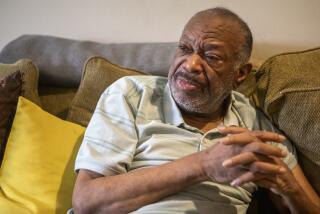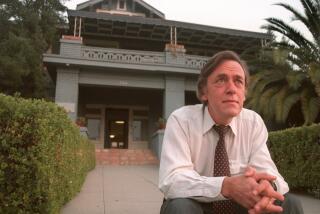Irving Hill; Longtime Federal Judge in L.A.
- Share via
Los Angeles federal Judge Irving Hill--whose long and distinguished judicial career was marked by an abiding concern for the downtrodden, especially minorities--collapsed and died of an apparent heart attack in his chambers Wednesday. He was 83.
Hill, who was named a senior judge in 1980 after 15 years’ service on the Central District Court and 16 months as its presiding judge, had declined to treat his senior status as a form of semi-retirement.
“He was still putting in five days a week,” said a close friend, retired Times foreign editor and correspondent Robert W. Gibson.
“He loved the law, and he loved being a judge,” Gibson said. “He once said, ‘They’ll have to carry me out of here.’ ”
Hill was a native of Lincoln, Neb.
He liked to tell how his uncle, a Jewish immigrant from the Ukraine, had settled in Lincoln because that was as far as his savings would take him on the train after his arrival in New York. Hill’s father, arriving later, followed suit.
Hill, reared in Lincoln, attended the University of Nebraska before graduating cum laude in 1939 from Harvard Law School, where he served as editor of the Law Review.
After Harvard, Hill worked for the Bonneville Power Administration in Oregon, the Department of Justice in Washington and the United Nations in New York, with time out for World War II duty as a Navy officer aboard a ship that was torpedoed in the English Channel not long after D-Day.
Hill practiced law in Beverly Hills and Los Angeles from 1947 until 1961, when he was appointed to the Los Angeles County Superior Court. He was nominated to the federal court by President Lyndon Johnson on June 10, 1965. The nomination was confirmed two weeks later.
All that was heady stuff, but Hill never forgot his immigrant roots.
“Inbred in me is a concern for the rights of the minority, no matter how unpopular,” Hill told a reporter in 1979. “Concern for religious and political freedom, human rights--just the right to practice a profession and get an education were things that were denied to my forebears.”
Hill struck down a California law barring aliens from certain public jobs, and he was especially proud of his decision that it was unfair to deny a black man a job purely because of his arrest record.
In 1987, he upheld a controversial visa lottery program that sped up permanent residency status for 10,000 immigrants, who otherwise might have had to wait for years to immigrate to the United States.
Among Hill’s high-profile cases was the civil dispute in 1984 between producer Robert Evans, director Francis Ford Coppola and a vast supporting cast over who was in charge of what in the film, “Cotton Club.”
Hill--who handled the matter with an air of wry bemusement, like a patient father presiding over petulant toddlers--was credited with restoring order to a Hollywood squabble that had dragged on for years.
Active in a wide variety of civic affairs, Hill was a regional board member of the National Conference of Christians and Jews, a member and three-term president of the Jewish Federation Council of Greater Los Angeles and an 11-year member of the board of directors of the United Way of Los Angeles County.
He leaves his wife, Maydee, and three sons--Lawrence, Steven and Richard.
Funeral services were pending.
Times staff writer Edward J. Boyer contributed to this story.
More to Read
Sign up for Essential California
The most important California stories and recommendations in your inbox every morning.
You may occasionally receive promotional content from the Los Angeles Times.










